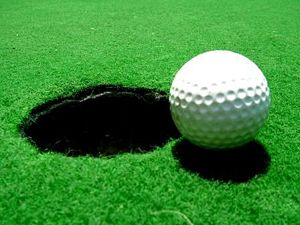Difference between revisions of "International Golf Proxy"
| Line 1: | Line 1: | ||
{{gameinfobox | {{gameinfobox | ||
|image =Golf.jpg | |image =Golf.jpg | ||
| + | |year=2010 | ||
|designer=Simon Katan | |designer=Simon Katan | ||
|players= 4-12 | |players= 4-12 | ||
Latest revision as of 14:38, 3 July 2022
| International Golf Proxy | |
|---|---|

| |
| Designer: | Simon Katan |
| Year: | 2010 |
| Players: | 4-12 |
| Stuff required: | a clipboard, paper, pen, and golf ball for every team, clipboard paper and pen for game runner. |
| Crew required: | One. |
| Preparation: | 5 minutes |
| Time required: | Thirty minutes. |
| Place required: | Large open spaces. |
| Activities: | Deduction, betting, strategy, bluffing. |
| This is a playable game - it's finished, tested and ready to play. | |
| This game is made available under an Attribution-Noncommercial Creative Commons licence. (What does this mean?) | |
Golf for your head. IGP fuses the warmer/colder game with poker style betting under a golf umbrella. The aim of the game is to score points by getting your imaginary ball closer to the imaginary hole than your fellow players and maximising your score by using the appropriate imaginary clubs.
The Course
The course consists of between three and five holes (determined by the game runner). Each consists of a tee-off, to be indicated by the game runner, and the hole itself which is not marked by anything and will only be revealed at the end of play on that hole. Players will be told the par before each tee-off. This indicates how many shots will be played for the hole as well as being a rough indicator of how far it is from the tee off.
Taking a Shot
To take a shot the golfer takes his swing from either the tee-off or the last place that their ball was - sound effects, shouting "fore" and clapping can be added if desired. For the first tee-off the order of play is determined randomly for all other tee-offs the order is determined by current score with the highest scoring teaming going first. After the golfer has swung, the caddy indicates where the ball has landed and places the team's ball in that location. Both golfer and caddy should continue standing in that location until it is time to take their shot again. After all teams have taken their shot, the game runner ranks the teams in order of which is closest to the hole. Before taking their next shot each team is told their own ranking and may request to find out the ranking of one other team. After the final shot of the hole is played, the players gather and the final rankings and the location of the hole are revealed and points awarded as follows;
- 1st Position = +2 points
- 2nd Position = +1 points
- 3rd Position = -1 points
- 4th Position = -2 points
- 5th Position = -2 points
Choosing Clubs
Before each shot players must choose a club from a selection of four clubs, Wood, 9 Iron, Wedge, and Putter. Each club has a point value (see below).
- Wood = 1 point
- 9 Iron = 2 points
- Wedge = 3 points
- Putter = 4 points
The total point value of all the clubs used during the game play of a single hole will be multiplied by the score at the end of that hole. For example if a team comes second on a four par hole and uses a wood, 9 Iron, and two putters for their shots, they will get a score of 1 x (1+2+4+4) or 11 points. The game runner will write down all team's club choices for a hole on a sheet of paper which all players are allowed to see at any time.
Bunkers
Some holes contain bunkers. If you inadvertently hit your ball into a bunker, the game runner will tell you and you will be forced to use a wedge on the next round.
Teams
Players either play in two's (Caddy and Golfer) or individually depending on how many players there are. When there is no caddy the golfer simply walks to the desired location and places the ball there. There should always be 4 or 5 teams. Each team should get a clip board, paper and pen to keep a track of their club choices and scoring.
Course Design
The main consideration should be use locations which are quite large and where all the players can see each other clearly. A variety of locations for your holes will add to the interest. Position the imaginary hole somewhere where it will be easy to rank the players in terms of position - corners and walls are good, the middle of the room is bad! Don't make the holes too long; I recommend pars of between 4 and 7. Work out specific areas for the bunkers. They should be placed far away from the hole. The intention is for them to act as a decoy by forcing players into using a higher ranking club than they might otherwise.
Play history
International Golf Proxy ran at an ICA Sandpit in June 2010, and at the Hide&Seek Weekender 2010.